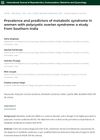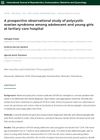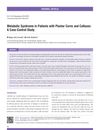
High insulin levels are more common and a better predictor of carbohydrate issues in women with PCOS than glucose tolerance tests.
 2 citations,
February 2023 in “BMC endocrine disorders”
2 citations,
February 2023 in “BMC endocrine disorders” Curcumin improved some metabolic factors in women with PCOS but did not affect cholesterol, insulin, or testosterone levels.
 60 citations,
February 2010 in “Gynecological Endocrinology”
60 citations,
February 2010 in “Gynecological Endocrinology” Metformin combined with lifestyle changes improves insulin resistance and reduces testosterone levels in women with PCOS more than lifestyle changes alone.
 26 citations,
August 2014 in “Genetic Testing and Molecular Biomarkers”
26 citations,
August 2014 in “Genetic Testing and Molecular Biomarkers” High levels of TNF-α may contribute to obesity and insulin resistance in PCOS, but not due to the C850T genetic variation.
 October 2021 in “Turkderm”
October 2021 in “Turkderm” Hormonal imbalances, not insulin resistance or dyslipidemia, may be more important in causing acne in women over 25.
20 citations,
June 2020 in “Journal of Advanced Research” High-dose vitamin A and E with zinc improved blood sugar control and insulin function in diabetics, but may cause hair loss.
 308 citations,
December 2018 in “PLOS Genetics”
308 citations,
December 2018 in “PLOS Genetics” The research found that PCOS has common genetic factors regardless of how it is diagnosed and is linked to metabolic and reproductive issues.
 121 citations,
April 2008 in “European Journal of Obstetrics & Gynecology and Reproductive Biology”
121 citations,
April 2008 in “European Journal of Obstetrics & Gynecology and Reproductive Biology” Many women in southern China have polycystic ovary syndrome, with some symptoms differing from Western women.
 73 citations,
June 2008 in “The Journal of Clinical Endocrinology and Metabolism”
73 citations,
June 2008 in “The Journal of Clinical Endocrinology and Metabolism” Polycystic ovarian shape is a genetic sign of PCOS and its hormonal and metabolic features can be inherited.
 67 citations,
February 2010 in “Acta Obstetricia et Gynecologica Scandinavica”
67 citations,
February 2010 in “Acta Obstetricia et Gynecologica Scandinavica” Hirsutism is a strong sign of high male hormones and metabolic problems in women with PCOS, but acne and hair loss are not.
 31 citations,
February 2021 in “Nutrients”
31 citations,
February 2021 in “Nutrients” Curcumin may improve blood sugar levels and cholesterol in people with PCOS, but more research is needed.
 19 citations,
January 2015 in “Indian Journal of Dermatology”
19 citations,
January 2015 in “Indian Journal of Dermatology” Skin changes in women with PCOS are mainly due to hormonal imbalances.
 18 citations,
January 2015 in “Journal of obesity and weight loss therapy”
18 citations,
January 2015 in “Journal of obesity and weight loss therapy” Eating less starch and dairy helped overweight women with PCOS lose weight and improve symptoms.
 16 citations,
March 2015 in “Wiener Klinische Wochenschrift”
16 citations,
March 2015 in “Wiener Klinische Wochenschrift” Vitamin D deficiency is common in women with PCOS and linked to some metabolic problems, but not the main cause of their metabolic issues.
 14 citations,
July 2016 in “Fertility and Sterility”
14 citations,
July 2016 in “Fertility and Sterility” Changing the diagnosis criteria for PCOS might miss women at risk for related health issues.
 14 citations,
August 2014 in “Applied Physiology, Nutrition, and Metabolism”
14 citations,
August 2014 in “Applied Physiology, Nutrition, and Metabolism” A low-starch/low-dairy diet may help overweight women with PCOS lose weight and improve metabolism, but more research is needed.
 7 citations,
August 2019 in “Endokrynologia Polska”
7 citations,
August 2019 in “Endokrynologia Polska” The free androgen index varies among women with different types of PCOS.
 6 citations,
December 2022 in “Frontiers in Pharmacology”
6 citations,
December 2022 in “Frontiers in Pharmacology” Quercetin may help improve symptoms of polycystic ovary syndrome.
 6 citations,
January 2015 in “International journal of reproduction, contraception, obstetrics and gynecology”
6 citations,
January 2015 in “International journal of reproduction, contraception, obstetrics and gynecology” More than half of the women with PCOS in Southern India had Metabolic Syndrome, with large waist circumference being the most common feature.
 6 citations,
August 2013 in “Fertility and Sterility”
6 citations,
August 2013 in “Fertility and Sterility” Eating cream can increase ovarian androgen production in women with Polycystic Ovary Syndrome, which is not related to obesity.
 4 citations,
January 2012 in “Journal of the Egyptian Women's Dermatologic Society (Print)”
4 citations,
January 2012 in “Journal of the Egyptian Women's Dermatologic Society (Print)” Women with female pattern hair loss may have a higher risk of developing metabolic syndrome.
 1 citations,
April 2021 in “Deneysel ve klinik tıp dergisi/Journal of experimental and clinical medicine”
1 citations,
April 2021 in “Deneysel ve klinik tıp dergisi/Journal of experimental and clinical medicine” Women with PCOS have a higher risk of metabolic syndrome and need lifestyle changes and treatment.
 October 2022 in “The Egyptian Journal of Hospital Medicine”
October 2022 in “The Egyptian Journal of Hospital Medicine” Females with idiopathic hirsutism have higher levels of omentin-1, which may lead to excessive hair growth.
 August 2022 in “International journal of reproduction, contraception, obstetrics and gynecology”
August 2022 in “International journal of reproduction, contraception, obstetrics and gynecology” The study found that 7.21% of young girls have polycystic ovarian syndrome, with symptoms like irregular periods, abnormal hair growth, and acne. Early diagnosis is important to prevent long-term complications.
 June 2022 in “Biomedical reports”
June 2022 in “Biomedical reports” STK11 gene variations do not predict how well metformin will work for PCOS, but may affect hair loss and excess hair growth.
 January 2022 in “International journal of zoological investigations”
January 2022 in “International journal of zoological investigations” Polycystic Ovarian Syndrome is common in overweight urban college girls and may increase the risk of heart and metabolic problems.

Women with female pattern hair loss may have a higher risk of metabolic syndrome.

Men with androgenetic alopecia may have a higher risk of metabolic syndrome.
 June 2022 in “Journal of the turkish academy of dermatology”
June 2022 in “Journal of the turkish academy of dermatology” People with plantar corns and calluses may have a higher chance of having metabolic syndrome.
 44 citations,
March 2008 in “European journal of endocrinology”
44 citations,
March 2008 in “European journal of endocrinology” Women with PCOS have lower ghrelin levels and a weaker response to sugar, which might affect their feeling of fullness and lead to overeating.





























